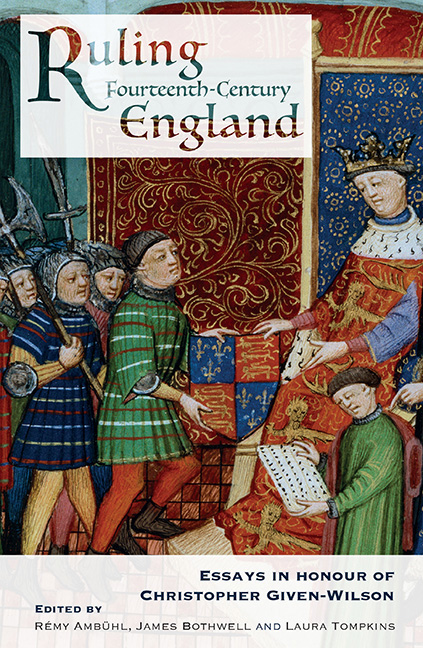Book contents
- Frontmatter
- Contents
- Contributors
- Abbreviations
- Introduction
- The Efficiency of English Royal Administration in the Last Years of Edward I
- Government and Market in the Early Fourteenth Century
- Kings' Clerks: The Essential Tools of Government
- Edward II: Favourites, Loyalty and Kingship
- The Perils of Lordship: The Life and Death of William Tuchet (c. 1275–1322)
- ‘War’, ‘Rebellion’ or ‘Perilous Times’? Political Taxonomy and the Conflict in England, 1321–2
- The Carlisle Roll of Arms and the Political Fabric of Military Service under Edward III
- What's in a Title? Comital Development, Political Pressures and Questions of Purpose in Fourteenth-Century England
- Edward the Black Prince: Lordship and Administration in the Plantagenet Empire
- ‘Said the Mistress to the Bishop’: Alice Perrers, William Wykeham and Court Networks in Fourteenth-Century England
- The Politics of Surrender: Treason, Trials and Recrimination in the 1370s
- Richard II in the Mirror of Christendom
- Bibliography
- Index
- Tabula Gratulatoria
The Perils of Lordship: The Life and Death of William Tuchet (c. 1275–1322)
Published online by Cambridge University Press: 18 September 2019
- Frontmatter
- Contents
- Contributors
- Abbreviations
- Introduction
- The Efficiency of English Royal Administration in the Last Years of Edward I
- Government and Market in the Early Fourteenth Century
- Kings' Clerks: The Essential Tools of Government
- Edward II: Favourites, Loyalty and Kingship
- The Perils of Lordship: The Life and Death of William Tuchet (c. 1275–1322)
- ‘War’, ‘Rebellion’ or ‘Perilous Times’? Political Taxonomy and the Conflict in England, 1321–2
- The Carlisle Roll of Arms and the Political Fabric of Military Service under Edward III
- What's in a Title? Comital Development, Political Pressures and Questions of Purpose in Fourteenth-Century England
- Edward the Black Prince: Lordship and Administration in the Plantagenet Empire
- ‘Said the Mistress to the Bishop’: Alice Perrers, William Wykeham and Court Networks in Fourteenth-Century England
- The Politics of Surrender: Treason, Trials and Recrimination in the 1370s
- Richard II in the Mirror of Christendom
- Bibliography
- Index
- Tabula Gratulatoria
Summary
In the late 1290s William Tuchet, although born into the lowest ranks of the Lincolnshire gentry, inherited an extensive Midlands estate and the king's favour which elevated him to the parliamentary peerage. He died in 1322, kicking on a gibbet at Pontefract, as a commoner and the king's enemy, with only a remnant of his former wide lands. His story is one of the failure of two types of lordship, that over land and that over men, and the two aspects are intimately linked. The gradual loss of his estate, an object lesson in the fragility of land title, led directly to his membership of the affinity of Thomas of Lancaster and thus to his death. This affinity famously failed to support its lord in 1322 and Tuchet's experience suggests at least one reason why this was so.
William was the eldest son and heir of Nicholas Tuchet (d. 1311) of Hainton (Lincolnshire), who belonged to the lesser ‘gentry’. Hainton was worth £15–20 a year and Nicholas claimed the minor manorial rights of a view of frankpledge and assize of ale. More importantly, William's mother Alice, who died before March 1298, was one of the two sisters of William of Louth (d. 1298), who was of obscure birth but became one of the great civil servants of the first half of Edward I's reign. He served as Cofferer of the Wardrobe from 1274 to 1280 and as keeper of the wardrobe from 1280 until 1290, when he was elected to the see of Ely. Louth acquired a great deal of land and, although he had another sister, Isabel, probably much younger and wife of the more eminent Midlands landholder Sir Roger de Mortain, Tuchet was his favoured heir and inherited more than three-quarters of the bishop's estate.
William was said to be aged thirty-six ‘or more’ in 1311, so he may have been around twenty-three in March 1298, when his uncle died. He was certainly then an adult but probably still young because he was not married.
- Type
- Chapter
- Information
- Ruling Fourteenth-Century EnglandEssays in Honour of Christopher Given-Wilson, pp. 93 - 112Publisher: Boydell & BrewerPrint publication year: 2019

